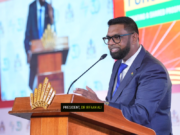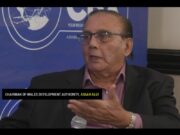By Feona Morrison
Should the High Court intervene at this stage, when the Guyana Elections Commission (GECOM) has put measures in place to facilitate the national recount of votes cast in the elections, it would be unlawful and result in the court straying from its functions, says retired Judge Claudette Singh, Chairperson of the electoral body.
In her submissions filed in the case of APNU+AFC candidate, Ulita Moore, who is asking the court for a declaration that the decision by GECOM to have a high-level team from the Caribbean Community (CARICOM) supervise the recount is in contravention of the Constitution and the Representation of the People Act, Justice Singh argues that GECOM is constitutionally empowered to order such a process.
To support her contention, the Chairperson relied on Article 162(1) (b) of the Constitution which reads that GECOM, “shall issue such instructions and take such action as appear to it necessary and expedient to ensure impartiality, fairness and compliance with the provisions of this Constitution or of any Act of Parliament on the part of persons exercising powers or performing duties connected with or relating to the matters aforesaid.”
Against this backdrop, Justice Singh said it would be unlawful for the High Court to intervene at this stage, and direct the Commission on the way forward, since it still has legal avenues available which includes accepting the report of Chief Elections Officer, Keith Lowenfield, or order a recount of the votes cast in the elections.
According to Justice Singh, once there is evidence that the electoral process was compromised then to ensure the impartiality, fairness and compliance with the provisions of this Constitution or of any Act of Parliament, GECOM is constitutionally mandated to intervene to ensure public confidence in the electoral process.
The Chairperson argued, “Thus, it is respectfully submitted that pursuant to section 22 of the Elections law Amendment Act No. 15 of 2000 and Article 162 of the Constitution with or without the Aide Memoire [between the President and Leader of the Opposition], [GECOM] has separate and independent powers under the Constitution to execute supervisory powers in respect to the electoral process.”
“This means that the Commission can order a recount,” Justice Singh has vehemently contended.
Also, she submitted that the applications by several contesting parties for recounts under Section 84 of the Representation of the People Act which were rejected by the Region Four’s Returning Officer, Clairmont Mingo, can be corrected by GECOM even at this stage.
In light of the foregoing, Justice Singh contends that GECOM has acted within the confines of the Constitution and based on the powers granted to it by same. As such, she holds that the court has no jurisdiction to intervene in the work of the Commission. Justice Singh said that based on the evidence, GECOM was in the process of exercising its constitutional supervisory functions when it was stopped by the injunction.
“The CARICOM [team] was simply the mechanism used to give effect to the recount. The order prepared by GECOM [for the recount] itself provided the reason for the necessity of the intervention by the Commission. It shows clearly that the CARICOM team was just the mechanism to assist in providing credible elections results to the nations,” the retired Judge explained through her lawyer Kim Kyte-Thomas.
According to GECOM’s Chairperson, if the court grants the orders being sought by Moore, it would be making decisions for GECOM, and “which is certainly not the lawful role of the court.”
Quoting the case of Benjamin et al v. Ministry of Information et al from the High Court of Anguilla, Justice Singh noted that Justice Adrian Saunders held the following:
“…Our democracy rests on three fundamental pillars, the legislature, executive and judiciary. All must keep within the bounds of the Constitution. The judiciary has the task of seeing to it that legislative and executive action does not stray outside those boundaries onto forbidden territory…The judiciary has to be careful that it too does not stray from its function and usurp the authority and role reserved for the other two pillars.”
Among other things, Justice Singh asked the court to reject Moore’s application and that GECOM be permitted to execute its constitutional functions with or without the CARICOM agreement.
Justice Franklin Holder, before whom she has made these submissions, has already ruled that he has the jurisdiction to inquire into the legality of GECOM’s decision to order the recount.
Apart from the declaration that GECOM’s decision is unlawful, Moore is further seeking an order prohibiting GECOM from conducting what she says is an unlawful recount of the votes, and to have the already declared results, for the 10 electoral districts be made final.
Justice Holder, will now conduct a trial, before deciding on a final order (s) in the case, which comes up for another hearing in the new week at the High Court in Demerara.











